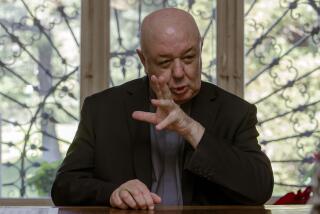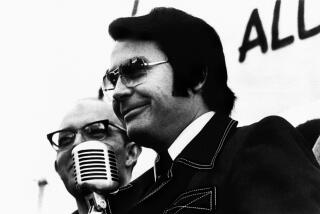Gorbachev-Pope Vatican Talks Named Top ’89 Religion Story : Writers’ poll: Jim Bakker’s conviction and sentencing ranks second followed by tide of reform and peaceful revolution in Eastern Europe.
The extraordinary meeting of Soviet President Mikhail S. Gorbachev and Pope John Paul II was the top religion news story of 1989, according to a national poll of journalists specializing in the field of religion.
At their Vatican meeting on Dec. 1, the Soviet leader and the Pope agreed in principle to establish diplomatic relations and talked about the pontiff making a visit to the Soviet Union. During the meeting--the first between a Pope and a Soviet leader--Gorbachev promised new freedom for religious activities and the legalization of the Ukrainian Catholic Church after 70 years of state-mandated atheism and suppression of religious liberty.
The members of the Religion Newswriters Assn. also picked Gorbachev as the No. 1 “religion newsmaker” of the year. Although a committed Communist and ostensibly not religious, Gorbachev received the rite of Christian baptism as an infant.
The religion news writers--the women and men who cover the news of religion for newspapers, news magazines and wire services--chose televangelist Jim Bakker as the No. 2 religion newsmaker for 1989. His sentencing to 45 years in prison after conviction on 24 counts of conspiracy and fraud against contributors was the news writers’ second-ranking news story. Bakker quit his religious network in 1987 following a sex scandal.
The tide of reform and peaceful revolutions in Eastern Europe, accompanied by the easing of religious restrictions and the role of the churches in bringing about radical changes to East Germany, Poland, Hungary and Czechoslovakia, was picked as the No. 3 story.
“A lot of that reform movement was fueled by the churches,” said Willmar Thorkelson of Minneapolis, who compiled the survey results. “By and large, that aspect hasn’t been told.” Thorkelson said in a telephone interview that the tallies might have been different if the poll had been conducted later. The surveys were mailed out during the second week of December, and 45 of the association’s 150 active members had responded by the Dec. 22 deadline.
Thorkelson said he believes that Panamanian Gen. Manuel A. Noriega’s taking refuge on Christmas Eve in the papal nuncio’s residence in Panama City--and the Vatican’s subsequent refusal to turn the deposed dictator over to U.S. officials--”would definitely have been one of the top 10 stories.”
A former Religion Newswriters’ Assn. president, Thorkelson also said he thought the story about expanding religious freedoms in East Europe might have specifically included Romania and moved up to No. 2 or 1 on the list if the survey had been conducted late this month. This year, Romanians were openly allowed to celebrate Christmas for the first time in 45 years.
Other top religion stories, as ranked by the religion writers, were:
4--The murder of six Roman Catholic priests and jailing and torture of other church workers in El Salvador, which sparked new demands by religious groups for the United States to end military aid to that nation.
5--Worldwide controversy over Salman Rushdie’s “The Satanic Verses,” a book Islamic zealots called blasphemous and degrading to the Prophet Mohammed. Iranian death threats sent Rushdie into hiding. The religion writers also chose Rushdie as their third-place newsmaker, following the Pope and Gorbachev.
6--Consecration of Barbara C. Harris, 55, as the first woman bishop in the worldwide Anglican Communion. She was elected by the Massachusetts diocese of the Episcopal Church.
7--Warning by the U.S. Catholic bishops against Catholic politicians taking a pro-choice position on abortion. Bishop Leo T. Maher of San Diego subsequently barred Lucy Killea from Holy Communion because of her outspoken pro-choice campaign stance, but she won an upset victory for a California Senate seat.
8--Renegade black Catholic priest George A. Stallings Jr. of Washington, D.C., suspended by Cardinal James Hickey after Stallings formed a breakaway African-American temple and charged that U.S. Catholicism is riddled with racism. Sending shock waves through the church, the fiery Stallings vowed: “We’re going national!” By year’s end, he had formed three congregations.
9--After initial waffling, the Vatican backed the relocation of a Carmelite convent from the Auschwitz death camp. In the controversy, Polish Cardinal Jozef Glemp had infuriated Jews and some Catholic leaders with his comments about Jews.
10--Religious groups condemned the Chinese army’s massacre of unarmed protesters in Beijing, and the Dalai Lama, exiled Buddhist leader of Tibet, was awarded the Nobel Peace Prize. Conferring the award was intended to draw sharp attention to the brutal crackdown on the students’ democracy movement.
In addition to picking the top 10 religion stories, the nation’s religion writers this year--for the first time--singled out incidents or organizations that “have done the most . . . to stifle the people’s right to know.”
The National Conference of Catholic Bishops won the 1989 “Into the Darkness Award” because, according to the survey, the prelates went into a closed session “for an entire afternoon” at their November session in Baltimore, refusing to divulge even what subjects were discussed. In 1988, despite objections from the religion news writers group, the bishops met privately to talk about AIDS and the use of condoms.
Second place in the “darkness” contest went to the Southern Baptist Convention. Newly elected fundamentalist trustees, meeting in major closed-door sessions with denominational executives, laid down tougher rules on tolerating theological diversity.
Other “darkness” citations went to the Episcopal bishops, who kept reporters out of small-group discussions about women bishops; and the United Church of Christ, which refused to disclose the vote totals for the election of the denomination’s new president. A white won over a black candidate, and church officials said everyone “should take their word” on how the vote came out.
“Normally,” said Ed Briggs of Richmond, Va., president of the Religion Newswriters’ Assn., “our individual objections to secrecy in religion fall on deaf ears. But hopefully, our coveted Into the Darkness Award will give those people who would take religion into darkness the recognition they deserve.”
More to Read
Sign up for Essential California
The most important California stories and recommendations in your inbox every morning.
You may occasionally receive promotional content from the Los Angeles Times.









